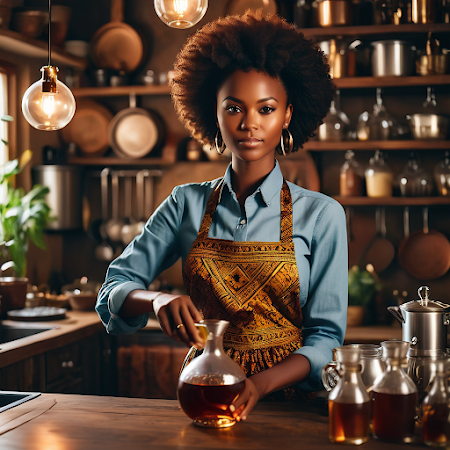Search This Blog
"Truth comes only to conquer those who have lost the art of receiving it as a friend." ~ Ravi Thakur
Featured
- Get link
- X
- Other Apps
Crafting Homemade Booze: A DIY Guide to Distilling Spirits like a Pro
Yesterday's brandy adventure was wildly popular, and I can tell that I have some thirsty readers out there. So, let's twist the dagger, shall we?
Exploring the art of crafting homemade booze can be an exciting and rewarding endeavour, especially for those looking to experiment with unique flavours and techniques. Following up on yesterday's brandy project, let's dive into the world of DIY alcohol production. Here's a basic overview of how to make booze at home:
1. Choose Your Base Ingredient
The first step in making homemade booze is selecting a base ingredient, which will determine the type of alcohol you'll produce. Common options include fruits like grapes for wine or brandy, grains like barley for beer or whiskey, and sugar-rich sources like molasses for rum.
2. Preparation and Fermentation
Once you've chosen your base ingredient, it's time to prepare it for fermentation. For fruit-based alcohols like brandy, you'll need to crush the fruit to extract the juice or pulp. (Or use raisins like I did 😁) Grains may require malting and mashing to convert starches into fermentable sugars. Mix the prepared ingredient with water and yeast in a fermentation vessel and let it ferment for several days to weeks, depending on the recipe.
3. Distillation
After fermentation, some homemade booze recipes may require distillation to increase alcohol content and refine the flavour. Distillation involves heating the fermented liquid to create vapour, which is then condensed back into a liquid form. This process separates alcohol from water and other impurities, resulting in a more concentrated and potent spirit.
4. Aging and Maturation
Once distilled, many spirits benefit from aging and maturation to develop complex flavours and smooth textures. Aging can take place in wooden barrels or casks, where the spirit absorbs flavours from the wood and undergoes chemical changes over time. The duration of aging varies depending on the type of alcohol and personal preference.
5. Bottling and Enjoyment
After aging, your homemade booze is ready to be bottled and enjoyed. Use clean, sterilised bottles to preserve the quality of the spirit. Label each bottle with the type of alcohol, bottling date, and any other relevant information. Share your creations with friends and family or savour them on special occasions.
6. Safety and Legal Considerations
Now that Riggy G is on the rampage, it's important to note that homemade alcohol production comes with potential safety risks and legal implications. Ensure that you understand the process thoroughly and follow best practices to prevent contamination and accidents. Additionally, familiarise yourself with local regulations regarding home distillation and alcohol consumption.
With these steps in mind, you can embark on your own homemade booze-making journey, whether you're crafting brandy, whiskey, rum, or any other spirit. Experiment with different ingredients, techniques, and aging methods to create unique and flavourful beverages that reflect your creativity and passion for the craft. Cheers to your DIY distilling adventures, and don't forget to let me know how it went! (I promise that I don't know Riggy G personally 😁)
- Get link
- X
- Other Apps
Popular Posts

The One On Why Uganda Produces Shitty Ads
- Get link
- X
- Other Apps

Of Australian Bogans Masquerading As Creatives In Nairobi Agencies
- Get link
- X
- Other Apps



Comments
Post a Comment